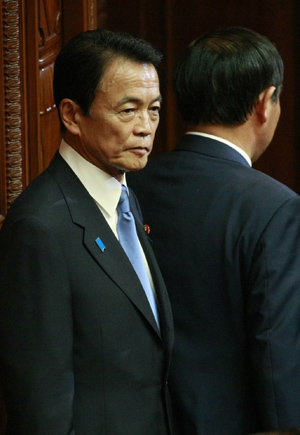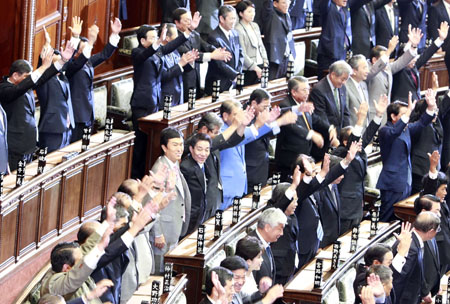Japanese Prime Minister Taro Aso on Tuesday dissolved the House of Representatives, setting the stage for a general election on Aug. 30.
At a plenary session of the lower house starting at 1 p.m., Speaker Yohei Kono read out the Imperial decree signed by the Japanese emperor, proclaiming the dissolution.
 |
|
Japanese Prime Minister Taro Aso attends a plenary session of the House of Representatives in Tokyo July 21, 2009. Japanese Speaker Yohei Kono read out the Imperial decree signed by the Japanese emperor during the plenary session of the lower house, proclaiming the dissolution and setting the stage for a general election on Aug. 30. [Ren Zhenglai/Xinhua]
|
Aso formally proposed the dissolution at a cabinet meeting earlier in the day, and all cabinet members signed the dissolution document, including Finance Minister Kaoru Yosano and Agriculture, Forestry and Fisheries Minister Shigeru Ishiba, who have both appeared dissatisfied with Aso's decision last week to dissolve the lower house.
"As we need further understanding and cooperation by the people for a safe and vigorous society, I decided to carry out the dissolution and seek a mandate from the public," Aso was quoted by Chief Cabinet Secretary Takeo Kawamura as saying to his Cabinet,
Following the dissolution, members of Aso's Cabinet agreed to hold the House of Representatives election on Aug. 30, with official campaigning set to begin Aug. 18.
The lower house election will be the first since September 2005, when then Prime Minister Junichiro Koizumi helped the LDP secure more than 300 seats in the 480-seat chamber.
The House of Representatives has 480 members, 300 of whom are elected by simple majority vote in single-member districts. The remaining 180 members are elected by proportional representation from a list of candidates selected by the political parties. The term of office for representatives is four years.
|

|
|
Members of the Japanese House of Representatives stand and cheer following Speaker Yohei Kono's dissolution announcement at a plenary session of the lower house in Tokyo, Japan, July 21, 2009.[Ren Zhenglai/Xinhua]
|
The key question at the forthcoming election is whether the ruling coalition of Aso's Liberal Democratic Party and New Komeito will be able to hold on to power, or if they will be replaced by a new government led by the opposition Democratic Party of Japan ( DPJ).
LDP currently have 303 seats in the 480-seat lower house, and their partner Komeito has 31. The DPJ has just 112.
But DPJ have been slapping LDP in the face by winning a string of local elections. Also on Tuesday, Aso apologized to LDP lawmakers for ruling party's defeats in the elections, especially the key Tokyo assembly election, and sagging support for the party.
In a Mainichi Shimbun survey released Monday, 56 percent of respondents said they want the main opposition DPJ to win the next House of Representatives election, compared with 23 percent of the respondents choosing LDP.
At a meeting with the lawmakers, Aso voiced deep regret while expressing his determination to remain in office.
He said that he has not been "good enough" to maintain solidarity within the LDP and that he has "caused trouble to many people as we failed to achieve our initial targets in a series of local elections, including the Tokyo Metropolitan Assembly."
The DPJ has vowed to break the almost consecutive rule of LDP in Japanese politics. Yukio Hatoyama, leader of the opposition, reiterated Tuesday the general election must be a "revolutionary" one to put an end to "bureaucrat-led politics and to make the public proactive,"
"We are determined to face it with a sense of historical mission." Hatoyama told a general meeting of DPJ lawmakers.
Aso is the third prime minister of Japan since 2005. Despite the rapid turn over of LDP prime ministers, Aso and others criticize the DPJ for inexperience in leading the country and claim it is therefore poorly qualified to handle the economic crisis.
Finance Minister Kaoru Yosano criticized Tuesday that a giddy DPJ was already "opening a bottle of champagne and celebrating" every night, charging them for putting politics ahead of the interests of the public, and challenging them to offer a detailed policy platform.